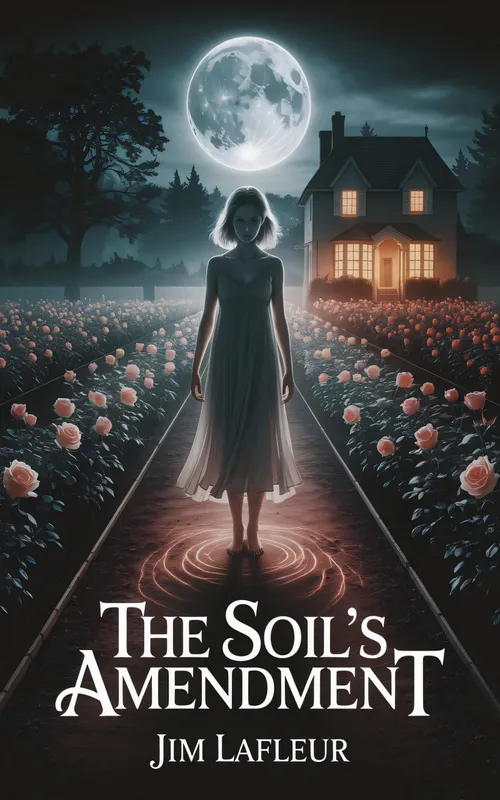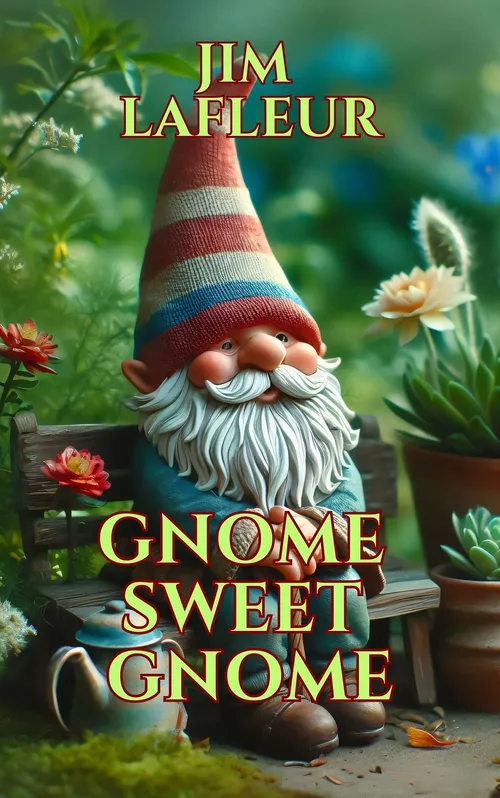The man she buried is back and knocking.
Sarah’s hands froze against the kitchen counter, her knuckles white as bone against the dark granite. The sound came again—three soft raps that seemed to echo through her ribcage. She had been washing dishes, the mundane ritual that kept her anchored to this new life, this careful existence built on borrowed time. Steam rose from the sink like incense, carrying the scent of lavender soap she’d bought to mask other smells. Earthier ones.
She dried her hands slowly, each movement deliberate. The towel felt rough against her palms—palms that remembered the weight of the shovel, the resistance of roots. Six months. Six months since that October night when Mark’s rage had finally pushed too far, when her survival instincts had overtaken everything else. The cast iron skillet had felt heavy in her hands then, heavier still when she’d cleaned his blood from its surface.
The knocking came again. Patient. Gentle.
Sarah’s breath caught like a moth in her throat. She approached the front door with the careful steps of someone walking across thin ice. The peephole revealed a familiar silhouette against the porch light—broad shoulders, that distinctive tilt of his head. But something was different. The rigid tension that had always coiled through Mark’s frame was gone, replaced by something softer.
“Sarah?” His voice drifted through the wood, warm honey where it had once been broken glass. “I know you’re there. I can see the light.”
Her reflection stared back from the hallway mirror—hollow cheeks, eyes rimmed with sleepless nights. She looked like a woman haunted, which perhaps she was. But haunted by guilt or by impossible hope, she could no longer tell.
“How?” The word escaped her lips before she could stop it.
“Open the door, love. Please.”
Love. He had never called her that. Not once in eight years of marriage. The endearment hung in the air like a foreign language, beautiful and terrifying. Sarah’s fingers trembled as they found the deadbolt—the same lock she’d installed the day after she’d buried him beneath the rosebushes, beneath the soil that everyone in town whispered about. The soil that made everything grow sweeter, stronger.
The lock clicked open with the finality of a coffin lid.
Mark stood on her doorstep holding wildflowers—delicate blooms she recognized from her own garden. His eyes, once sharp as winter mornings, now held the warmth of summer rain. The cruel lines that had mapped his face were smoothed away, leaving behind something almost serene.
“Hello, Sarah,” he said, and smiled like he meant it.
She let him in because what else could she do? The impossible stood before her, patient as stone, waiting for her decision. Mark stepped across the threshold she had fortified against his memory, and the house seemed to exhale—a held breath finally released.
“You look tired,” he said, setting the wildflowers on the hall table with careful reverence. His movements were fluid now, lacking the sharp edges that had once made her flinch. “Have you been sleeping?”
Sarah stared at him, cataloging differences. The hands that had once left bruises now gestured with gentle precision. The mouth that had spat venom now curved in concern. Even his scent had changed—earth and honeysuckle instead of bourbon and rage.
“You’re dead.” The words felt absurd leaving her lips. “I killed you.”
Mark’s expression didn’t change. No flash of anger, no tightening around his eyes. He simply nodded. “Yes. You did.”
“Then how—”
“The soil, Sarah. You’ve always known it was special.” He moved toward the living room, and she followed despite every instinct screaming at her to run. “Remember Mrs. Ivan’s prized tomatoes? The way they glow like lanterns in the evening light? Or the Yamamoto’s roses—blooms the size of dinner plates?”
She did remember. The whole town whispered about the gardens, about harvests that defied explanation. Old-timers spoke of the earth itself as if it were alive, as if it had preferences and moods. Children dared each other to sleep on the cemetery ground, claiming you could hear the soil breathing in the dark.
“That’s just folklore,” Sarah whispered, but her voice lacked conviction.
Mark settled onto the couch—their couch, where he’d once thrown her down in drunken fury. Now he arranged the cushions as if he belonged there, as if six months in the grave were merely a long vacation.
“Is it?” He tilted his head, studying her with those impossibly warm eyes. “You buried me among the roses, didn’t you? Where the soil runs deepest, richest. Where the roots drink from the town’s heart itself.”
Sarah’s legs gave out. She sank into the chair across from him, the same chair where she’d sat the morning after, scrubbing his blood from beneath her fingernails and planning her alibis. The police had been gentle when they’d questioned her about his disappearance. Poor Sarah, they’d said. Married to a man like that. She deserves better.
“I don’t understand.” Her voice cracked like autumn leaves.
“The soil takes what’s broken,” Mark said softly, “and makes it whole. It took my anger, Sarah. The rage that ate me alive—gone. Fed to the earth like compost.” He leaned forward, and she smelled honeysuckle again, sweet and cloying. “It gave me back to you the way I should have been. The way you deserved.”
Tears blurred her vision. This was Mark—his face, his voice, his memories—but wrapped in kindness like a gift she’d never dared to want. The man she’d married before alcohol and disappointment had curdled him into something monstrous.
“I’m sorry,” she whispered. “For what I did. I’m so sorry.”
“Don’t be.” He reached across the space between them, his fingers brushing hers. His touch was warm, alive, impossible. “You saved us both that night. Freed us from what we’d become.”
Sarah stared at their joined hands—hers scarred from desperate digging, his unmarked by the grave. Outside, the garden rustled in the evening breeze, and she imagined she could hear the soil singing, satisfied with its work.
***
The days that followed moved like honey, thick and golden with unfamiliar peace. Mark cooked breakfast while she showered, humming melodies she’d never heard him sing. He tended the garden with reverent hands, coaxing blooms from soil that seemed to respond to his touch. At night, he read to her from books he’d never shown interest in before—poetry, stories of redemption and second chances.
But Sarah tested him. She had to.
She spilled coffee on his favorite shirt, the one she’d bought him for their anniversary years ago. He’d once slapped her for less. Now he simply smiled and said, “Accidents happen, love,” before changing into something else. She broke his grandmother’s china cup—the one he’d treasured above all else. He swept up the pieces without a word of reproach, his movements gentle as prayer.
“Don’t you miss it?” she asked one evening as they sat on the porch, watching fireflies dance above the roses. “Being angry?”
Mark turned to her, confusion creasing his brow. “Miss it? Like missing a fever?” He laughed, the sound lighter than she remembered. “Anger was a poison, Sarah. It ate me from the inside out. Why would I miss dying?”
She watched his profile in the twilight, searching for cracks in this new facade. But there were none. Only patience, only kindness, only the man she’d dreamed of in her darkest hours of marriage.
“Sometimes,” she whispered, “I think I’m going crazy. That this is all some elaborate hallucination.”
“Does it matter?” Mark took her hand, his thumb tracing the scar where she’d cut herself on his wedding ring while burying him. “We’re together. We’re happy. Isn’t that enough?”
She wanted to say yes. God, how she wanted to surrender to this impossible gift. But doubt gnawed at her like roots in winter soil, persistent and hungry. Late at night, when Mark slept peacefully beside her—and how strange it was to sleep without fear—she would study his face in the moonlight. Looking for tells, for signs of the monster she’d known.
The town noticed the change in her. At the grocery store, Mrs. Morris commented on how rested she looked. The mailman mentioned her improved garden, how the roses seemed to glow with their own light. Even the children who’d once crossed the street to avoid her house now lingered by her fence, drawn by the sweet scent of impossible blooms.
“It’s the soil,” Mark would say when she mentioned these observations. “It’s healing everything it touches. Including us.”
But healing implied something had been broken. And as Sarah watched Mark tend to plants with almost religious devotion, she wondered what else the soil might be changing. What else it might be fixing. The thought followed her through those honey-thick days like a shadow she couldn’t shake.
One afternoon, she found him in the garden, his hands buried deep in the earth beneath the roses. His eyes were closed, his face serene, and for a moment he looked less like her husband and more like something that had grown from the ground itself.
“Mark?”
He opened his eyes, and for just an instant—a heartbeat, a breath—they were completely black. Then the moment passed, and his familiar warmth returned.
“Just listening,” he said, brushing soil from his hands. “The earth has so much to say if you know how to hear it.”
***
The end came on a quiet Tuesday evening, gentle as rainfall.
They sat on the porch sharing wine, the garden a dark ocean of flowers in the moonlight. Mark spoke of memories—their first date, their wedding day, moments she’d nearly forgotten in the blur of years that followed. His voice carried the weight of nostalgia, but something else too. A precision that made her skin crawl.
“Remember that morning after your mother’s funeral?” he said, swirling wine in his glass. “You were so broken, crying at the kitchen table. I told you to stop being dramatic, that grief was just self-pity in disguise.”
Sarah’s breath caught. She did remember. It had been one of his cruelest moments, a blade twisted into her deepest wound. But why would this new, gentle Mark recall such a thing? Why would he treasure it?
“You said she was weak,” Sarah whispered. “That I was becoming weak like her.”
Mark nodded, his eyes distant. “I was teaching you strength. Showing you that only the strong survive.” His voice carried an odd reverence, as if he were recounting scripture. “You needed to learn that lesson before—”
He stopped abruptly, blinking as if waking from a dream. The warm smile returned to his face, but Sarah had seen what lay beneath it. A flicker of the old rage, like a shark’s fin cutting through calm water.
“I’m sorry,” he said quickly. “I don’t know why I said that. Sometimes old thoughts just… surface.”
But Sarah was already backing away, wine glass forgotten as it shattered against the porch floor. The sound echoed through the garden like breaking bones.
“The soil didn’t fix you,” she breathed. “It just buried it deeper.”
Mark’s face went very still. In the moonlight, his eyes were wells of shadow. “Sarah—”
“You remember every cruel thing. Every moment of pain you caused. You treasure them.” The truth hit her like ice water. “The soil doesn’t change anything. It just makes better camouflage.”
Mark stood slowly, and for a moment his movements held that old, predatory grace. Then the mask slid back into place, gentle and concerned. But Sarah had seen. She knew.
“The soil is so giving, isn’t it, Sarah?” His voice was honey again, but underneath lurked something ancient and patient. “It can fix anything. Anyone.” He stepped closer, and she smelled earth on his breath, rich and loamy. “Even you.”
The words hit her like a physical blow. She understood now why the town’s gardens thrived, why the produce glowed with impossible color. The soil didn’t resurrect—it replaced. It took what was broken, what was unwanted, and offered something better in return. Something compliant.
“How many others?” she whispered.
Mark smiled, and his teeth gleamed white in the darkness. “Mrs. Ivan’s husband was such an angry man. Always shouting about her gardening. But the soil fixed him, made him appreciate her gifts. The Yamamoto’s daughter was so rebellious, so disrespectful. Now she helps with the roses every day, never argues, never questions.”
Sarah backed toward the garden’s edge, where the roses grew taller than any she’d seen. The soil beneath her feet felt warm, eager, alive.
“The town is becoming perfect,” Mark continued, following her with unhurried steps. “One replacement at a time. One amendment at a time. And you, my love—you opened the door. You fed it what it needed to begin.”
Her heel struck soft earth, and she stumbled. The ground seemed to reach up, welcoming, hungry. Mark caught her hand, steadying her with impossible gentleness.
“Don’t be afraid,” he whispered. “The soil will fix you too. Take away your guilt, your fear, your stubborn independence. Make you into the wife I always wanted you to be.”
Sarah felt the earth shifting beneath her feet, smelled the sweet, cloying scent of roses in bloom. Around them, the garden hummed with contentment, patient as the grave. She looked into Mark’s eyes—kind, loving, perfectly empty—and understood her ordeal was only just beginning.
As he guided her deeper into the garden, the soil warm and eager beneath her bare feet, Sarah wondered if anyone would miss the woman she’d been. Or if they’d simply love the better version the earth would offer in her place.






This story has not been rated yet. Login to review this story.